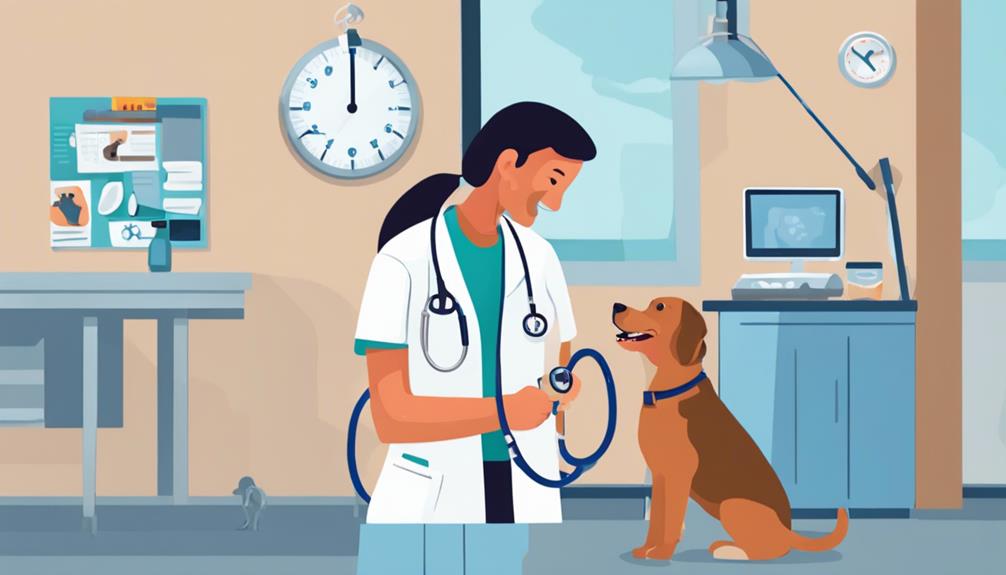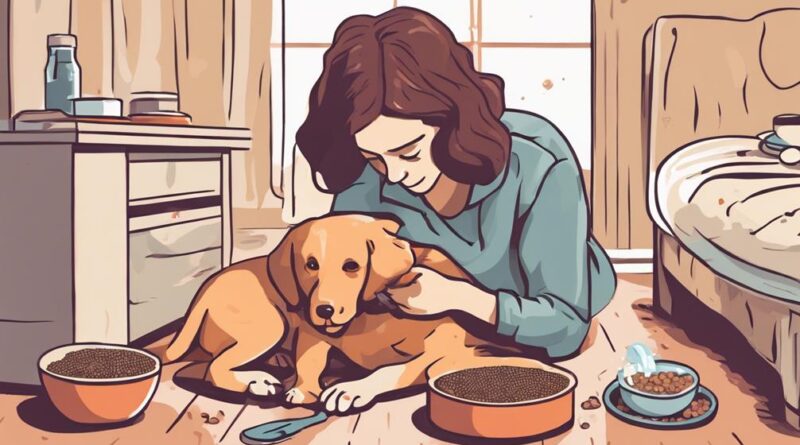Essential Dog Care Tips for New Owners
Imagine embarking on a new adventure filled with wagging tails and wet noses. As a new dog owner, you've taken the first step towards a rewarding journey, but there's much more to uncover beyond the initial excitement.
From decoding your furry friend's behavior to ensuring their well-being, each aspect of dog care plays a vital role in fostering a strong bond.
Let's explore the essential tips that will guide you through this fulfilling experience, ultimately shaping you into a responsible and loving pet parent.
Understanding Your Dog's Needs
To properly care for your new furry friend, understand their specific needs and preferences. Pay close attention to your dog's behavioral cues as they can provide insights into how they're feeling and what they may need. Bonding with your dog is essential for building a strong relationship based on trust and love. Spend quality time together, engage in play, and show them affection to strengthen your bond.
Dogs require mental stimulation and enrichment to keep their minds sharp and prevent boredom. Provide interactive toys, puzzle feeders, and training sessions to challenge their cognitive abilities and keep them engaged. Regular walks, visits to new places, and social interactions with other dogs can also provide mental stimulation and enrichment for your furry companion.
Establishing a Routine
Establish a consistent daily schedule for your dog to provide structure and stability in their life. Dogs thrive on routine, so establishing a set daily schedule will help them feel secure and understand what to expect. Consistency is key when it comes to your dog's daily schedule. Make sure to feed them, take them for walks, and provide playtime at the same times each day. This routine will also help you anticipate your dog's needs and behaviors.
Incorporating consistent habits into your dog's daily schedule is essential. This includes feeding them at the same times each day, taking them out for bathroom breaks regularly, and setting aside time for exercise and play. Consistent habits won't only benefit your dog's physical health but also their mental well-being.
Providing Proper Nutrition
Establishing a consistent daily routine for your dog also involves providing proper nutrition to support their overall health and well-being. Meal planning plays a crucial role in ensuring your furry friend receives a balanced diet. It's essential to choose high-quality dog food that meets their nutritional needs based on factors like age, size, and activity level. Additionally, incorporating dietary supplements can help address specific health concerns or deficiencies.
Weight management is another key aspect of proper nutrition. Maintaining your dog at a healthy weight is vital for their well-being and can prevent various health issues. Portion control is essential to prevent overeating and obesity. Be mindful of feeding guidelines and monitor your dog's body condition regularly to adjust portion sizes as needed.
Regular Exercise and Playtime
Ensuring your dog engages in regular exercise and playtime is crucial for their physical health and mental well-being. Regular physical activity not only helps maintain a healthy weight but also keeps their muscles strong and improves cardiovascular health. Additionally, engaging in playtime provides mental stimulation and prevents behavioral issues that may arise from boredom.
Here are some tips to make the most out of your dog's exercise and playtime routine:
- Interactive Toys: Incorporate toys that dispense treats or require problem-solving to keep your dog mentally engaged.
- Outdoor Adventures: Take your dog for walks in different environments to provide new sights and smells, offering mental stimulation.
- Playdates: Arrange playdates with other dogs to encourage social interaction and keep your furry friend emotionally happy.
- Training Games: Use playtime as an opportunity for basic training exercises to stimulate your dog's mind and strengthen your bond.
Grooming and Hygiene Practices
Regular grooming and hygiene practices are essential for keeping your dog healthy and happy. Brushing your dog regularly helps maintain a shiny coat, removes dirt, and prevents matting. Depending on your dog's breed and coat type, you may need to brush them daily or a few times a week. Use a brush suitable for your dog's coat to avoid discomfort or skin irritation.
When it comes to bathing, the frequency varies. Bathing your dog too often can strip their skin of natural oils, leading to dryness and irritation. Generally, dogs should be bathed every 3 to 4 months unless they get excessively dirty or have skin issues requiring more frequent baths. Use a dog-specific shampoo to avoid skin problems and make sure to rinse thoroughly to prevent any residue.
Incorporating proper brushing techniques and bathing practices into your dog's routine not only keeps them clean but also helps you bond with your furry friend. Remember, a clean dog is a happy dog!
Training and Socialization
To help your new dog adjust to their surroundings and interact positively with others, focus on training and socialization right from the start. Consistent training and socialization are key to shaping your dog's behavior and ensuring they're well-adjusted and friendly companions. Here are some essential tips to guide you through this process:
- Behavior Modification: Use positive reinforcement techniques to encourage good behavior and discourage unwanted actions. Reward-based training methods are effective in shaping your dog's behavior in a way that's both kind and efficient.
- Socialization Techniques: Introduce your dog to various environments, people, and other animals to help them feel comfortable and confident in different situations. Early socialization can prevent fear and aggression issues later on.
- Training Classes: Consider enrolling your dog in obedience classes or working with a professional trainer to establish good manners and enhance your bond.
- Consistency is Key: Be patient and consistent with your training efforts. Dogs thrive on routine and clear expectations, so make sure to set achievable goals and stick to them.
Health Monitoring and Vet Visits

When it comes to keeping your new dog healthy and happy, monitoring their well-being and scheduling regular vet visits are crucial steps. Regular check-ups play a vital role in ensuring your dog's overall health. These visits allow the vet to detect any potential health issues early on, enabling prompt treatment.
Establishing a vaccination schedule is also essential to protect your dog from various diseases. Your vet will guide you on the necessary vaccinations based on your dog's age, breed, and lifestyle.
It's recommended to schedule annual check-ups for adult dogs and more frequent visits for puppies and senior dogs. During these visits, the vet will conduct a thorough examination, update vaccinations if needed, and address any concerns you may have regarding your dog's health.
Creating a Safe Environment
Ensure your new dog's safety and well-being by creating a secure environment in your home. Setting up safe boundaries and secure containment areas will help prevent accidents and keep your furry friend out of harm's way. Here are some essential tips to consider:
- Use baby gates: Install sturdy baby gates to restrict access to certain areas of your home, especially if you have rooms that are off-limits or hazardous for your dog.
- Secure fences: Regularly inspect and maintain your backyard fences to prevent your dog from escaping or encountering potential dangers outside.
- Hide toxic items: Keep household cleaners, chemicals, medications, and other toxic substances out of reach or locked away to avoid accidental poisoning.
- Avoid small objects: Pick up small items like toys, coins, or small electronics that your dog could swallow and choke on.
Frequently Asked Questions
How Can I Help My Dog Overcome Separation Anxiety?
To help your dog overcome separation anxiety, start by crate training and incorporating desensitization techniques. Gradually increase the time you spend away from your dog while they're in the crate to help them get used to being alone.
Use positive reinforcement and rewards to create a positive association with being alone. Seek guidance from a professional trainer if needed to develop a tailored plan for your pup's needs.
What Are Some Ways to Keep My Dog Mentally Stimulated and Prevent Boredom?
To prevent boredom in your dog, try interactive toys and puzzle games. These activities engage your pup's mind and keep them entertained.
Obedience training and agility exercises are also great ways to stimulate your dog mentally.
Is It Necessary to Brush My Dog's Teeth Regularly? if So, How Should I Go About It?
Brushing your dog's teeth regularly is essential for their dental care. Pet dental hygiene is important to prevent dental issues and maintain overall health.
To brush your dog's teeth, use a dog-specific toothbrush and toothpaste. Start slowly and gently introduce the process to your dog. Gradually increase the duration of brushing sessions.
Consistent dental care can help prevent dental diseases and keep your dog healthy.
How Can I Prevent My Dog From Developing Bad Habits, Such as Chewing on Furniture?
To prevent your dog from developing bad habits like chewing on furniture, consider crate training. Use positive reinforcement to encourage good behavior. When you catch your dog chewing on furniture, redirect their attention to a chew toy.
Gradually increase their time in the crate, rewarding calm behavior. Consistency is key to helping your dog learn appropriate behavior and avoid destructive habits.
Are There Any Natural Remedies or Supplements That Can Help Improve My Dog's Overall Health and Well-Being?
To boost your dog's health naturally, consider holistic remedies like herbal supplements. These can contribute to your pet's overall well-being.
Alongside that, think about making dietary changes and establishing regular exercise routines. These actions can help enhance your dog's vitality and keep them in top shape.
Conclusion
Now that you have the essential dog care tips for new owners, remember to show your furry friend love and attention every day.
By understanding their needs, establishing a routine, providing proper nutrition, regular exercise, grooming, training, and health monitoring, you're setting your dog up for a happy and healthy life.
With these tips in mind, you can create a safe and loving environment for your beloved companion.
Enjoy the journey of being a dog owner!
